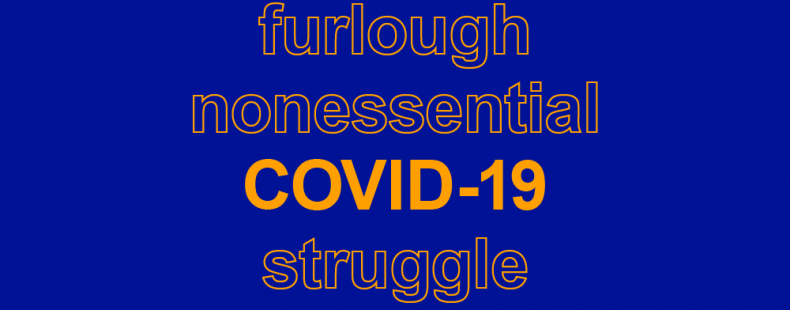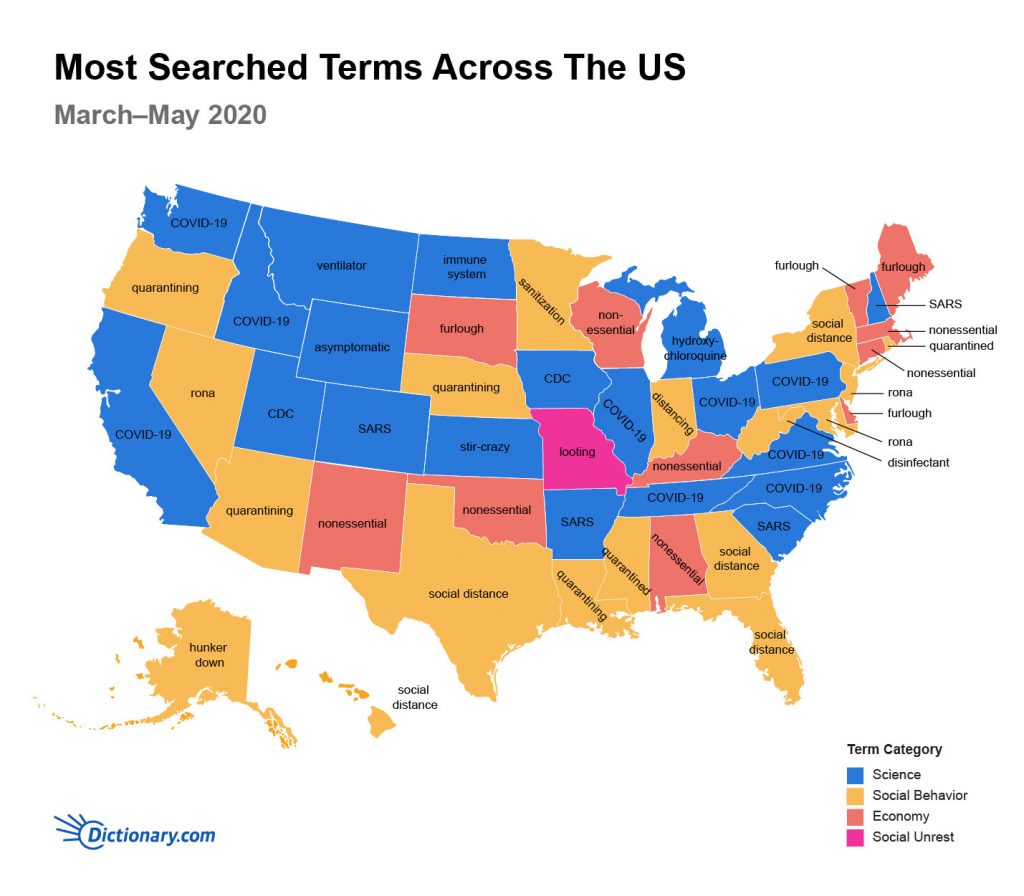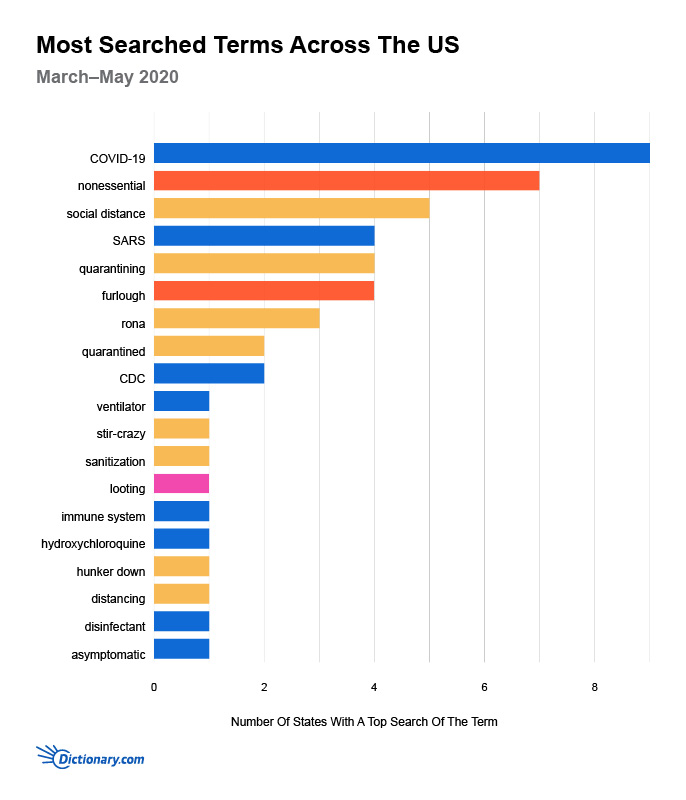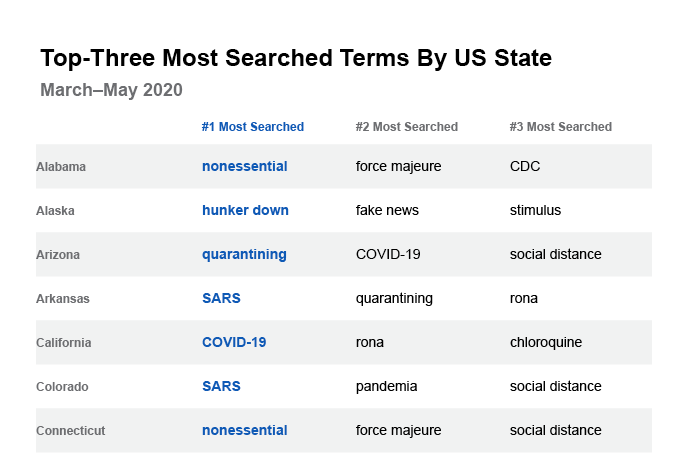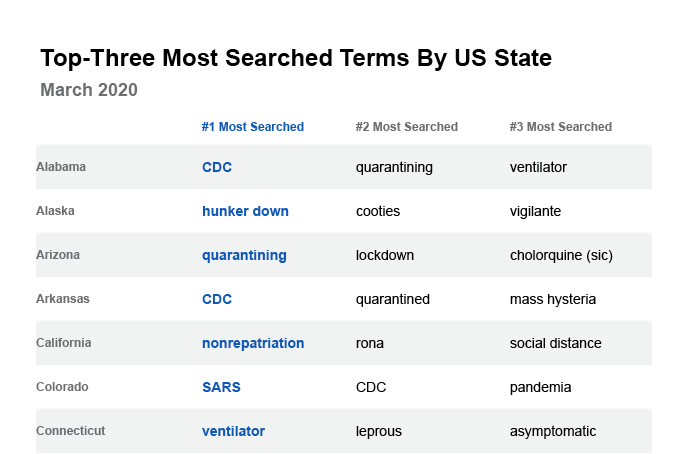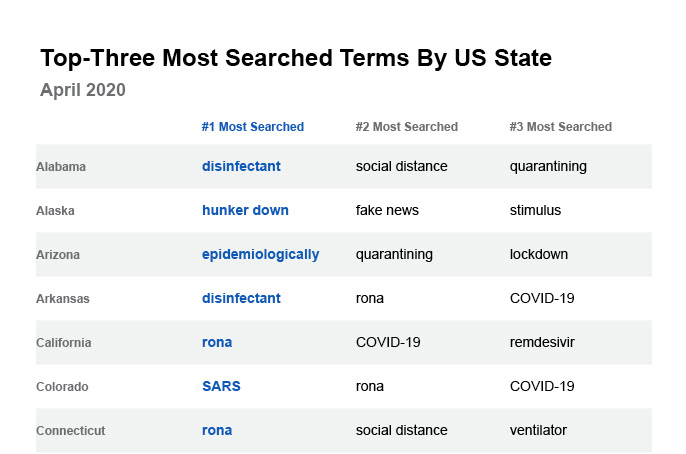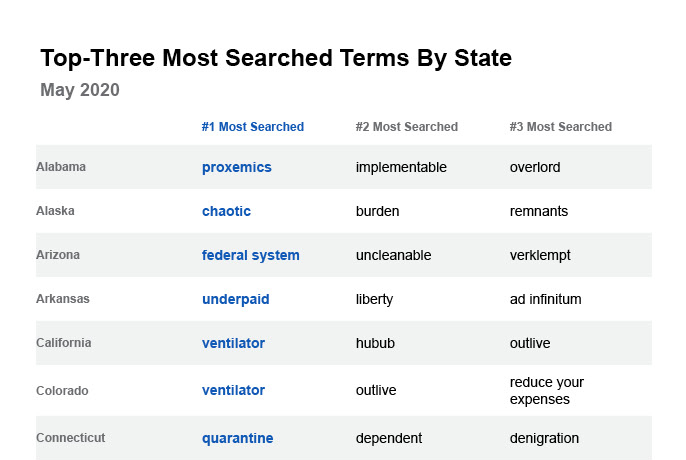You probably don’t need any data to know that 2020 has been like no other year in recent history—and it’s only half over.
But, for those of us fortunate enough to have the opportunity to reflect, some data can help us take stock at this midyear mark on just how transformative 2020 has been. All around the world, COVID-19 has changed our health, jobs, relationships, and behaviors. In the midst of the ongoing outbreak, protests for racial justice have started to change some social institutions—and deeply held beliefs about who we are as a country.
And we can see this tremendous change in new and newly prominent words we have been using in 2020—as well as the words that are top of mind in search trends.
Our data scientists at Dictionary.com analyzed the top searches on our site (misspellings included) across each US state during the height of the pandemic and protests as compared to January 2020 before the term COVID-19 existed. The results tell a shared—and shifting—story of the concerns and curiosities of a nation under change.
Click the image below to expand it!
Overall top searches by state
We crunched the numbers in several ways. First, we looked at the top searches in each US state across the months of March, April, and May all together. Then, we looked for patterns by identifying how many states had the same top search terms and how many states had unique ones. The bar chart below displays the range and frequency of terms states searched.
Click the image below to expand it!
In a total of nine states, COVID-19, the name of the disease caused by the novel coronavirus, was the most searched term. Other scientific terms topped the searches in other states, such as SARS (a different type of coronavirus) and asymptomatic, which became widely used after it was discovered many people can show no symptoms of COVID-19 but still spread the disease.
The economic impact of the pandemic is another clear theme in the top-search data. Furlough (a temporary layoff from a job) led searches in four states; seven states most searched for nonessential during this time period as cities limited the movement of nonessential workers and restricted nonessential activities to slow the spread of the virus.
COVID-19 upended our social behaviors—and our vocabulary around them, as seen in such top searches as social distance (5 states) and quarantining (4 states), which redefined our everyday lives and interactions.
The #1 most searched term in Missouri, looting, is a standout. Despite the far-reaching impact of the pandemic, looting that occurred around peaceful protests against police violence proved top of mind in the Show-Me State, if search data is any measure.
Now, let’s zoom out a bit. In the table below, we present the top-three most searched terms in each state over March–May, collectively. Not just the #1 most searched term, but the #2 and #3 terms as well.
Locate your state. Locate the state where friends and family live. What about neighboring or rival states? What do you discover? What new themes emerge? Struggle emerged in North Dakota and oppressive in South Dakota; stimulus surfaced out in Alaska whereas hydroxychloroquine did down in Florida. What conclusions might you make about your state?
Click the image below to expand the chart and find your state!
Top searches in March
Overall, leading lookups in the combined time period of March–May show pandemic topics preoccupied state searches. But, if we analyze the months of March, April, and May individually, the data tells a story of changing searches—and, if that can be used as any proxy, changing concerns—as 2020 unfolded.
Top searches in March suggest people in many states were seeking immediate information about COVID-19 as the country was first processing the extent of the pandemic and adjusting to a new reality as we sheltered in place amid rising cases, falling stocks, and lives on pause.
The most common #1 searched term across states was CDC, or Centers for Disease Control and Prevention, which has been providing essential public health and safety guidelines. This was followed by quarantine, nonessential, and furlough, reflecting the immediate impact on lives and livelihood.
It’s interesting to note that the name for the novel coronavirus disease—COVID-19—is nowhere to be found outside one instance of covid, the third most searched term in Texas in March. It’s also interesting to note the prevalence of nonrepatriation in the top-three searches for eight states: California, Illinois, Indiana, Montana, North Carolina, Pennsylvania, Tennessee, and Texas. Non-repatriation refers to preventing someone from returning to their country of citizenship; many people were stranded overseas as quarantines were put into place.
Also interesting: “Armaggedon,” an understandable misspelling of Armageddon, topped searches in Idaho, perhaps indicating an apparent “end-of-the-world” mood. In South Dakota, meanwhile, fuhrer—properly Führer in German, meaning “leader” and notoriously used as a title for Adolf Hitler—was the #1 March search. We’ll leave any speculation to you.
Click the image below to expand the chart and find your state!
Top searches in April
Moving into the #1 most searched terms for April, we see COVID-19 move up the ranks, but it is second only to its slang name, rona, illustrating how wordplay, humor, and the social bonding they facilitate are still vital in times of crisis. Another highlight: disinfectant trended not only because we were disinfecting the many surfaces of our lives, but also because President Trump controversially suggested injecting disinfectants to treat COVID-19. (Do not do this; it will harm or kill you.)
Science terms dominated searches in April, with a showing of some economic vocabulary—national debt surged in Oregon as the government rolled out a historic $2 trillion stimulus package.
Social issues were of importance, too, as partisan tensions emerged over stay-at-home mandates. Potentially speaking to these issues were class warfare, which was the #1 most searched term in Louisiana term for April, and freedom of assembly, the top search in Oklahoma. Class warfare means “conflict between different classes in a community resulting from different social or economic positions and reflecting opposed interests.” Guaranteed by the First Amendment of the US Constitution, freedom of assembly is “the right to hold public meetings and form associations without interference by the government.”
Compared to March and May, April’s data forms the most consistent searches. If we consider the top-three searches for all 50 states together, there were 27 total instances of COVID-19, 19 for rona, and 18 for social distance—amounting to nearly 50% of all top-3 searches in the Union.
Click the image below to expand the chart and find your state!
Top searches in May
If April had the most uniform searches, May had the most distinct ones. There were still top lookups for health and science terms around COVID-19, but user search interests were ceding to a complex mix of other words, underscoring just what an unprecedented experience 2020 has been.
Episodes of social and political unrest erupted at the very end of May around the peaceful George Floyd protests, but interest in terms connected to them still managed to climb to top spots for the entire month:
- Antifa (#1 in Michigan): “a left-wing political movement opposing fascism and often using militant tactics”
- dehumanizing (#1 in Oregon): “depriving of human qualities”
- ethnocentrist (#1 in Delaware): “relating to or someone who espouses belief in the inherent superiority of one’s own ethnic group or culture”
- looting (#1 in Massachusetts): “opportunistically stealing things from physical locations during chaotic situations”
- rioting (#1 in New Jersey): “involving people in a crowd are engaging in violence and/or destruction in the streets or another public space”
- white people problem (#1 in Missouri): “a fairly minor problem, complaint, etc., associated with a relatively high standard of living; a first world problem”
Elsewhere in the US, top searches in May chart a complicated lexical geography, as it were, of multifarious thoughts and feelings about the pandemic and protests—and our society and selves at their intersection. Alabamians were searching for proxemics (“the study of spatial requirements”), and Arkansans ad infinitum (“to infinity; without limit”). Alaskans were looking up chaotic, New Hampshirites sorrowful. In Arizona, searches spiked for verklempt (“overcome with emotion”), verboten (“forbidden”) in South Carolina. The top-three searches in Hawaii create an emotional map all of their own: #1 convulsed, #2 empathetic, and #3 incompetent.
Click the image below to expand the chart and find your state!
And as for how our word map of the US will change over the months ahead? We won’t make any predictions—other than the terms searched on Dictionary.com will surely continue to register the diverse and common concerns we have across the US in 2020.
- See how Black Lives Matter protests changed top search trends in May and June 2020.
